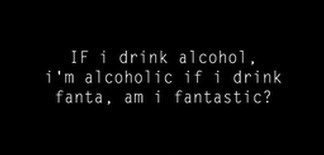“My name is Damien, and I’m an alcoholic.” This is the conventional way to introduce oneself at a meeting of the fellowship.
It bugs me.
The very first time I said these words they were incredibly powerful and liberating — when I finally said them, my surrender was complete. But as my sober time increases, I’m growing more uncomfortable with saying these words.
They’re not inaccurate. These words defined my drinking in the end.
The Merriam-Webster dictionary defines alcoholic as “affected with alcoholism” and alcoholism as “continued excessive or compulsive use of alcoholic drinks.”
But these words do not define me.
These words focus on the problem rather than the solution. Every time I introduce myself at a meeting, I struggle with how to label myself. I wrestle with a few phrases in my head, more often than not, I default to using these words even though they irritate me.
I smoked cigarettes for about 8 years in my late teens and early 20’s. I was good for about a pack to a pack and a half a day (depending on whether I was drinking that day or not). When I was smoking, I knew that I was “a smoker.” But when I quit, I no longer identified myself as “a smoker.” Sometimes, I call myself an “ex-smoker,” but more often than not, I say that I quit smoking. I don’t identify myself as a smoker today because I don’t smoke. It’s not part of my identity.
Identity.
That’s what this is about. This is my struggle. See, I’m no longer drinking alcohol — why would I identify myself as someone who does so compulsively? Identity is complicated and those of us who are in the fellowship tend to complicate things.
So, we call ourselves alcoholics all the time.
Sure some of us are still drinking, but most aren’t — the program works better when you’re not drinking. Still we refer to ourselves with a term that implies “continued excessive or compulsive use of alcoholic drinks” even if we’ve been sober for years. I’m not sure that makes sense.
I know this line of thinking represents a challenge to the doctrine “Once an alcoholic, always an alcoholic,” (Alcoholics Anonymous 4th Edition, page 33). I know this may make some people uncomfortable. But I believe that old lines of thinking should be challenged every now and then.
Before anyone calls the GSO to report me as a heretic, let me reiterate that I’ve surrendered, that I understand fully that I suffered from an addiction to alcohol, that it was ruining my life, and that I don’t plan to drink today (or tomorrow, or the day after that — you get the point).
With that said, I’ve been thinking about how to introduce myself at meetings. I’ve heard a number of different introductions in the rooms:
“I’m a grateful alcoholic”
“I have a desire to stay sober today”
“I’m a sober alcoholic”
None of these really work for me. I am grateful, but I’m not grateful to be an alcoholic. I’m grateful to be in recovery.
I really don’t have a desire to stay sober, in fact, frequently I have a desire to enjoy a glass of bourbon — and I would, if only I could do so without following it up with another, and another, and another. I’d be really grateful if that were a possibility, but it’s not.
And “sober alcoholic?” I don’t even know where to start. The phrase brings to mind Song of Myself by Walt Whitman:
Do I contradict myself?
Very well then I contradict myself,
(I am large, I contain multitudes.)
Lately, I’ve been choosing to say, “My name is Damien, and I’m an alcoholic in recovery.” I like this because it refocuses the attention on my recovery. But it’s not working.
There is a certain cadence to a meeting that often drowns out the words “in recovery.” Many of us have a hard time listening, and very often, as soon as the word “alcoholic” leaves my lips there is a thunderous “Hi Damien” that tramples the words “in recovery.” I’m not even sure anyone has heard those words come out of my mouth at a meeting.
I’m considering starting to introduce myself as being in recovery. I like the words that are used in the videos on theroomsproject.org, “I’m a person in long term recovery. For me that means I don’t drink alcohol and have been sober since September 23rd, 2015.”
I like these words because they acknowledge the most important thing about me first — I am a person. Next they focus on my recovery and finally they acknowledge my drinking past.
Still, I’m not quite ready to start using these words in meetings. Firstly, I don’t consider three months “long term” recovery. I’m not sure what qualifies as “long term” but three months isn’t it. Secondly, this is a mouthful — I’m not sure I want to say it every time I introduce myself at a meeting. Thirdly, fear. I’m afraid that people will find it arrogant or pretentious; that somehow I am afraid to say the words, “I’m an alcoholic.”
Maybe the best thing to say would simply be, “I’m Damien. I’m in recovery.” And leave it at that, because really, that’s what matters to me most. My recovery is more important than any label or identifier because it’s through my recovery that I’ve been able to reclaim my life and rebuild my relationships with my wife and son.
And, for me, that’s what this is all about. Living a happy, healthy, and fulfilling life with the people who love me despite my faults.








31 Comments
Hey Damion ~ Thanks for writing on this topic. It is so true on introduction in our meetings and the different ways to do so. Over the years I have found its kinda like what pair of shoes am I gonna wear today. I often say I am a very grateful recovering alcoholic~ when I remember.
Thanks Kathleen. I really like your shoe analogy. I’m sure with time I’ll come to settle on something that feels right, and I”m also sure that what feels right will change over time.
Well said. You really captured my thoughts on this topic.
Glad to hear it!
Damien thanks so much for your thoughts on this topic. You captured perfectly what I have experienced in my recovery. I also grappled with this identification as an alcoholic after a period of sobriety. What I have found is yes I am recovered , in the sense of the first promise of the big book. Having recovered from a hopeless state of mind and body. And yet I am and still identify myself as alcoholic in that I will always carry with me that fact of physical craving that happens after I put alcohol into my body. That once alcohol is introduced into my bloodstream I develop a craving that induces me to take more alcohol. I also have the many “isms” that our big book talks about. Some of these are found on page 52.
So in a broader definition of alcoholism. I remain an alcoholic.
Thanks for your perspective.
I don’t claim to be recovered, far from it. If I were to take a drink that would undoubtedly awaken the cravings and I would again suffer from continued excessive and compulsive use of alcoholic drinks.
the big book does say recovered … the introduction is one of unity and singleness … recovering or recovered .. your complete identity need no be in an inrtoduction .. think of it as aiding the new comer for identification puropses
Hello Damien,
A great read. Here’s what worked for me. “He’ll my name is Currie and I haven’t found it necessary to take a drink since July 20, 1997”
Have a great day.
Thanks for passing this on! I really like this because it’s short and simple. I may give it a spin the next time I share at a meeting.
I love the article it has inspired me to say I’m Lisa and I identify myself as a person in recovery. Thank u Damien, I am learning to that its not about what the fellowship thinks of u and in time letting go of what they think and more on what u think is right for u. Doing something over and over that harms our souls. Is the same thing we did in active addiction. 12 step program saved my ass. I admitted it over and over I am an alcoholic/addict. Today with the inspiration of this video I won’t anymore. Why bc it hurts my soul who I am in there is not an alcoholic. Thank you so very much Damien.
Thank YOU Lisa! You have no idea how much this warms my heart. Have a wonderful day.
Damien, please keep one thing in mind people like me seem to complicate things. talk about it with your Sponsor. myself i have no problem stating i’m alcoholic. at an open meeting you could just say your name and at a closed meeting you need ti identify being alcholic for everyone’s else in the room . grateful to have you on board kep coming . and they only thing that is consistent is Change !!
Jimmy G.
Thanks for your advice, Jimmy. I have discussed this with my sponsor in the past (specifically when I first came into the rooms), but I’ll talk with him in more detail.
I’m curious why you say I need to identify myself as an alcoholic at a closed meeting. My local inter-group emphasizes that the only requirement to be a member of AA is a desire to stop drinking and that if you have a desire to stop drinking you’re welcome at a closed meeting, they even have this printed in our “Where & When” listing of meetings.
when i first came around it was explained that way to me .that at a closed meeting i needed to identify for the confidentiality of the people sitting in the meeting . For myself it doesn’t matter what anyone identifies as because all i need to know is what i am and why i’m there. and that is to help the next Alcoholic. not sure but it’s worked for me since 7/8/1988 Thanks be to God .Peace my Brother Jimmy G.
Okay, I get understand better now. Thanks for sharing the explanation.
I hear ya. I’ve known it for 10 years and have had periods of sobriety, up to 2.5 years, but I know I it is likely that I will always be an alcoholic.
I’ve only been to half a dozen or so different AA meetings, but the constant talk of drinking makes me want to drink.
The best thing for those 2.5 years was that my identity was someone who doesn’t drink. Working to get back there.
Thanks Noah. I found a meeting that is an open discussion meeting is most helpful to me. This meeting only has speakers when it’s someone’s anniversary, other than that we read from Daily Reflections and have an open discussion – minimal cross talk. This meeting does not focus on the drinking. Maybe you can find a similar meeting. Good luck and remember, one day at a time.
Very well written my friend.
I am an addict. I am an alcoholic. And will always identify myself as such.
I am a master manipulator and can and will rationalize me using at almost any moment once I declare myself and start to believe myself cured. Which is what recovered implies. This is why I do not say recovered and also you have to mind what you say because others may take it differently and we are dealing with ultimately life and death here. As someone said earlier they need something almost set in stone because of their tendency to complicate everything.
It’s what works for me and in the end that is all that matters. The big book and AA are guides to, and through, sobriety. They will even say there are no rules except one, do not drink or use. Everything else is what worked best for others that came before us.
Take from it what you need and what works for you to stay sober. If it offends or bothers someone else, f- em’ The only thing that matters is YOUR sobriety. But be aware of your surroundings and people who’s life might be on the edge are listening.
We are all brothers and sisters in this war!
Also I love your boots.
Thank you brother.
As always, you’re words serve as good counsel for me and I appreciate you pointing out the life or death nature of our addictions. As I continue to work this out in my head, I will be thinking about your comments deeply.
Give that little man of yours an extra hug tonight. They don’t stay little for long.
Thank you brother.
As always, you’re words serve as good counsel for me and I appreciate you pointing out the life or death nature of our addictions. As I continue to work this out in my head, I will be thinking about your comments deeply.
Give that little man of yours an extra hug tonight. They don’t stay little for long.
I think you are thinking to much. Just enjoy being sober and don’t worry so much about how you introduce yourself. We are all drunks living a sober, clean happy life today. I can’t ask for much more 2/10/83. Ray S.
Thanks Ray. You may be right. I am enjoying being a sober man. Its made my life so much better in so many ways.
3 months sober and you’re already trying to change the program. Good luck. You’ll soon see just how “sober” you are if you continue to challenge everything that comes your way and try to make it “fit” or “comfortable” to your liking.
The very first thing I had to do was cease fighting everything and everyone. Just take the suggestions, In 12 years I have never been steered wrong by the people who have made them.
Thanks for your comments. I’m not trying to change the program, just questioning what’s right for me. Have a blessed day.
Hi Damian,
A thought provoking piece. i am in early recovery, circa 21months, yet i only have my sobriety for a day at a time.
I AM SO GRATEFUL FOR THIS PROGRAMME as it helped me recognize finally why i thought and behaved as i did while active.
i believe the reason i am happy and grateful to say i am an alcoholic is to remind myself where my thought/ego took me in the past…
that is my current view which may change….knowing now that change is the only constant in my physical life… you are doing good its part of the process…
namaste…
I’m right there with you in regards to being grateful for the program and the fellowship. It is hugely important to be mindful of where we were in the past.
Thanks for sharing your perspective with me.
Hi Damien, my name is Barbara Dunlap and I am a member of Alcoholics Anonymous
Thanks Barbara, that’s a great way to introduce oneself.
Hi Damien,
I feel ya on this point. I want to start saying. Hi I’m Scot and I have alcoholism. This phrase for me 1) focuses that I am a person and 2) that alcoholism is a medical disease 3) fits into the cadence of the meeting. Nowadays it’s best to refer to someone as a person with epilepsy not an epileptic. It’s along the same line of thoughts. But I am always to embarrassed to break from tradition so I usually keep to the norm.
I completely agree! We have huge power with our words. I want to take ownership in recovery, as well.
It’s a big reason why I stopped attending meetings and go to meditation groups instead.
Thank you for the confirmation.